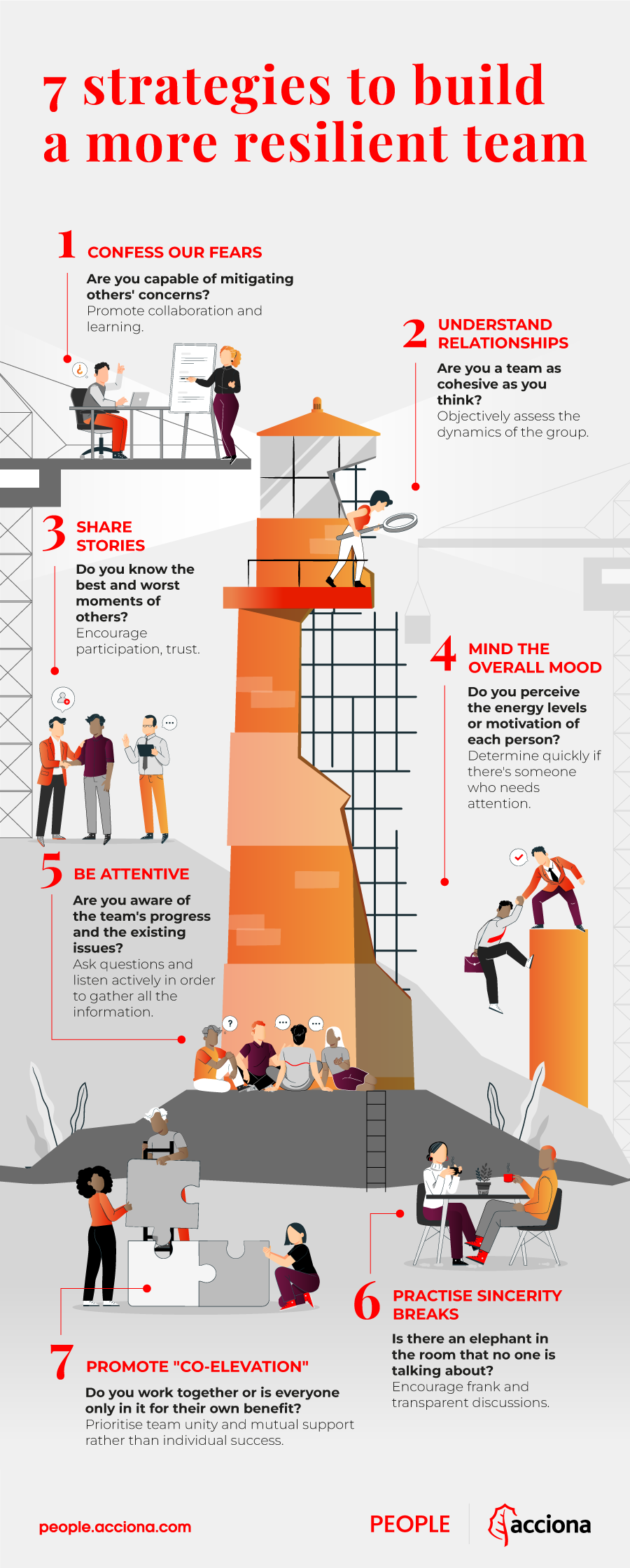Whether it is an entrepreneur who manages to get his business off the ground after bankruptcy, a scientist who discovers the drug that will save thousands of lives after years of unsuccessful research or an athlete who manages to win a championship after an injury, the stories of overcoming all have one thing in common: resilience.
It’s often identified as one of the factors that help people succeed. But few of us work entirely alone, and how resilient teams persevere is critical to a company’s organisational culture (and its bottom line). This is what business professors at North Carolina State and the University of Arkansas Bradley Kirkman and Adam Stoverink talk about in Unbreakable: Building and Leading Resilient Teams.
What am I going to read about in this article?
The 4 qualities of resilient teams
Resilience is the ability of individuals or communities to bounce back from adverse situations or overcome obstacles, even emerging stronger from them. It involves endurance, flexibility and adaptability to change. Resilience also refers to the ability to bounce back from traumatic experiences, losses or times of stress. Being resilient does not mean that one does not feel pain or suffering, but that one is able to cope with these feelings and move forward with strength and positivity.
“Resilience is the ability of individuals or communities to bounce back from adverse situations or overcome obstacles”.
Much of the book by Professors Bradley Kirkman and Adam Stoverink is devoted to the four qualities that the authors believe teams must cultivate to achieve resilience.
Confidence in the team
Team confidence, the authors point out, is not really the sum of a lot of individual confidence. A bunch of inflated egos do not benefit the team. The goal is collective confidence.
When there’s trust within a team, great things can be achieved and obstacles can be overcome more efficiently and effectively. But to build this trust, it is essential to:
* Have clear and respectful communication.
* Be willing to listen and learn from others.
* Build a space for mutual understanding.
Each team member must feel that they can share their ideas without fear of being judged.

Prevent rather than cure
Foresight is crucial in any teamwork. Knowing what’s expected, being aware of the goals to be achieved and having a clear roadmap is vital to keep the team aligned and on track for success.
It’s about drawing up a plan that reflects the roles and responsibilities of each member so that the others can know and be familiar with each other’s work. It even helps team members to know how to carry out each other’s roles so that, at any time, one person can replace another and the work is not put at risk.
When it comes to team problem solving, it is crucial to always be prepared to deal with any difficulties that may arise along the way.
Ability to improvise
At this point, when we talk about resilient teams, it is as important to know the responsibilities and roles of the other team members as it is to have improvisation skills to solve problems that may arise during the process.
Recommendations here include setting up teams “with a high level of diversity of thought”. The ability to improvise allows each team member to think quickly of creative solutions and adapt to different situations. Working in a team involves communication and collaboration, so being able to improvise and adapt to the needs of others is essential to achieving goals together.
One example is the rapid and creative response of the Apollo 13 operations team when one of the spacecraft’s oxygen tanks exploded 205 000 miles above the Earth. Using various items they had on the shuttle, and pooling their knowledge and experience, they created a device to remove carbon dioxide from the lunar module, allowing the crew to breathe enough to return home.
Supportive culture
Do your team members genuinely care and share in both success and failure? Resilient teams are made up of people who care deeply and genuinely about each other. Resilience is often expressed in a deep commitment to “co-elevating” the team rather than seeking individual recognition or success.
Rather than focusing on competition and individualism, the supportive culture seeks to ensure that:

* Team members work together to achieve common goals.
* People feel supported at all times.
* A happier and healthier working environment is fostered.
* Productivity and job satisfaction are increased.
The CFO of a Fortune 100 company, hired to transform his division, was concerned about the failure of an initiative where the budget had been exceeded and deadlines weren’t being met. Teams were not collaborating with each other. They didn’t even share information or communicate with each other. Instead, they were working on their own.
20 divisional teams, comprising 389 members in total, participated in a series of interpersonal trust assessments to understand the behaviours that promoted or hindered trust and performance. Each team committed to take specific actions to strengthen collaboration, not only among themselves, but also with those in other divisions.
Six months later, trust-building behaviours had increased by 63% and trust-hindering behaviours had decreased by 80%. After one year, the initiative had been completed on time and on budget, and employee engagement scores had increased by 25%. Team members had moved from working competitively to collaboratively. They had become resilient teams.
The challenge of keeping teams cohesive in the age of flexible working arrangements
As the philosopher Heraclitus said, change is the only constant in life. And it happens whether we resist to it or not. Being prepared to face it as a resilient and cohesive team is the best way to adapt and survive. This is what has happened in the new post-pandemic reality of work.
Together we are stronger. And this statement is not just a simple phrase. A team is made up of several people who contribute different points of value. It is the sum of the talent, energy and resources of different individuals.
“A team is the sum of the talent, energy and resources of different individuals”.
But when several people work together, it is because the challenge to be overcome or the goal to be achieved requires different skills possessed by different individuals. This means that members have to coordinate, communicate and, at times, expose themselves to disagreements or disputes.
Avoiding tensions, motivating and keeping a team cohesive is a challenge in the age of flexible working. The role of the leader will be essential. A manager who knows the strengths and weaknesses of his or her team members and knows how to encourage them with communication based on emotional intelligence will be able to work with resilient teams.
In conclusion, resilient teams are key to success in any work environment. The ability of a group to adapt to adverse situations and emerge stronger from them not only improves the working environment, but also increases productivity and performance. To achieve this, it’s crucial to encourage open communication and collaborative work, as well as to seek creative solutions to challenges. In addition, it is essential to recognise and value the individual strengths of each member and to support each other in times of crisis. By working together in a resilient way, teams can achieve more ambitious goals and successfully deal with any obstacles along the way.
Sources:


